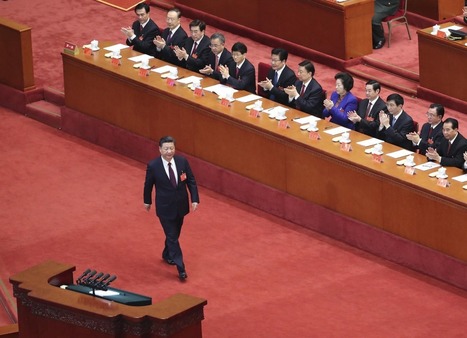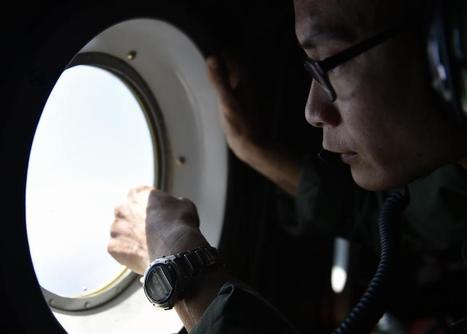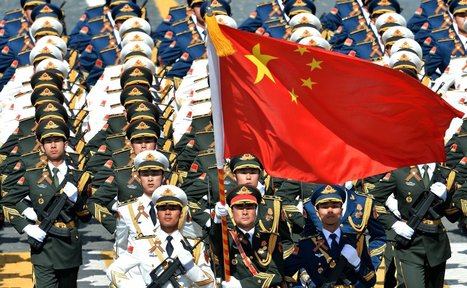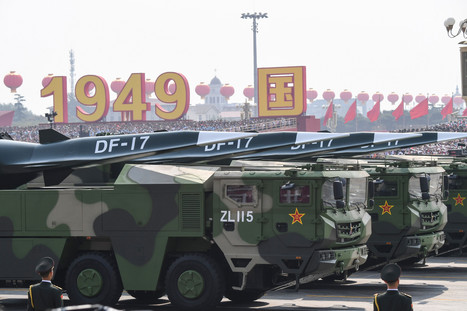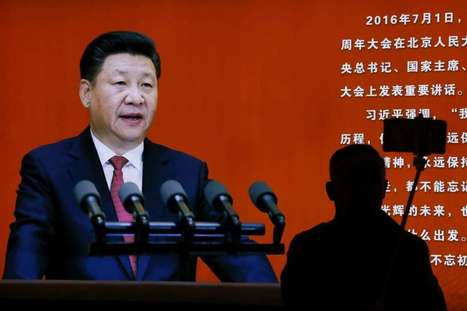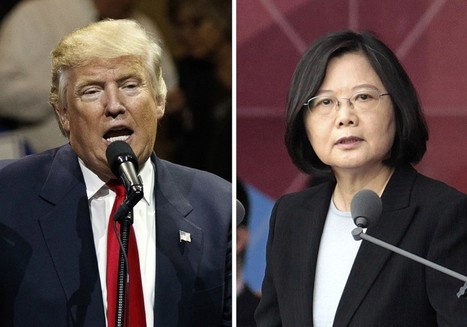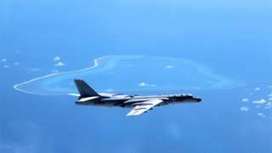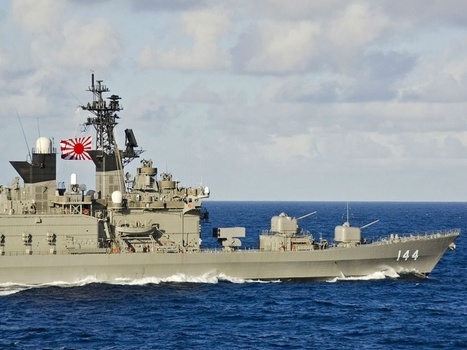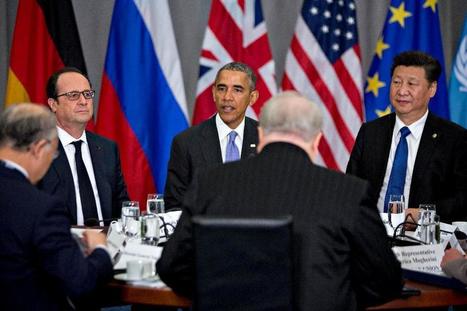 Your new post is loading...
 Your new post is loading...
BEIJING — American and European companies involved in joint ventures with state-owned Chinese firms have been asked in recent months to give internal Communist Party cells an explicit role in decision-making, executives and business groups say.
It is, they say, a worrying demand that threatens to put politics before profits, and the interests of the party above all other considerations. It suggests that foreign companies are no longer exempt from President Xi Jinping's overarching vision of complete control.
"The creeping intrusion by the party apparatus into the boardrooms of foreign-invested enterprises has not yet manifested itself on a large scale, but things are certainly going down that path," said James Zimmerman, a managing partner of the law firm Sheppard, Mullin, Richter and Hampton and former chairman of the American Chamber of Commerce in China, who is instructing clients to "push back."
The party's demand would give its cells a formal role in approving management decisions, such as investment plans or personnel changes. And that is ringing alarm bells.
China has vowed to become a powerhouse in AI within 15 years and launch a “robot revolution” to remain competitive in manufacturing even as wages rise. it is also leveraging Big Data to create a form of surveillance capitalism—in which economic value is created and controlled through the harvesting of data about every aspect of people’s daily activities—the likes of which the world has never seen.
The fourth industrial revolution is gathering steam, but unless the U.S. can continue to attract the best talent from overseas while also educating a domestic workforce suited to the jobs to come, this time it might not be an American revolution.
Xi Jinping is tightening his grip on power. How did one man come to embody China's destiny?
A senior adviser to Trump suggested that he knew about the long-standing U.S. policy toward Taiwan when the call occurred.
“He’s well aware of what U.S. policy has been,” Kellyanne Conway said in an interview with CNN on Friday night.
Conway bristled when asked whether Trump was properly briefed before the call on the government’s long-standing policy, questioning why President Obama did not receive similar queries about his knowledge of foreign affairs.
“President-elect Trump is fully briefed and fully knowledgeable about these issues . . . regardless of who’s on the other end of the phone,” she said.
Ric Grenell, a former George W. Bush administration spokesman at the United Nations, who was spotted visiting with Trump transition team officials at Trump Tower on Friday, said the president-elect’s call was planned in advance and that Trump took the call on purpose.
“It was totally planned,” Grenell said. “It was a simple courtesy call. People need to calm down. The ‘One China’ policy wasn’t changed. Washington, D.C., types need to lighten up.”
American film studios are playing a leading role in the growing strategic and ideological competition between China and the U.S., and Washington is taking note. Sixteen members of Congress wrote a letter calling for scrutiny of Chinese investments in the U.S. film industry, and former Rep. Frank Wolf (R-Va.) wants a review of Hollywood’s pursuit of Chinese box office. “By controlling the financing and distribution of American movies [in China],” Wolf wrote in a recent Washington Post op-ed, “and [by] subjecting them to censorship..., Beijing could effectively dictate what is and isn’t made.”
Government attention to these issues raises the specter of federal regulation of culture — a brand of McCarthyism that would be worse than the problem it seeks to solve — but the lawmakers’ warnings are on target. American filmmakers have already made common cause with Chinese censors in pursuit of profit. Writing scripts to satisfy the rulers of the People’s Republic doesn’t simply weaken the films the U.S. exports to China, it limits what plays at the multiplex on American soil, and it diminishes our understanding of the greatest geostrategic challenge America will face over the coming decades: the rise of China.
"Chinese official has said China has the right to set up an air defence zone over territory it claims in the South China Sea. • The statement from Vice-Foreign Minister Liu Zhenmin comes a day after an international tribunal said there was no legal basis for China's claims. • China has overlapping claims with other countries to reefs and islands across almost all of the South China Sea. • It has already said it will ignore the tribunal's findings. • President Xi Jinping has said China's 'territorial sovereignty and marine rights' in the seas will not be affected by the ruling 'in any way'."
Here is the problem, simply put: there are not enough analysts to make sense of every ship or activity at sea; nor enough government assets to persistently monitor them all. This reality is changing however, thanks to the rise of commercial space players who have already affected the national security landscape in significant ways.
The Asia-Pacific region is mostly water, which is why Maritime Domain Awareness (MDA) gets a lot of attention in matters of peace, prosperity, and security. The importance of MDA surfaces in practice when, say, China maneuvers in the South China Sea and the U.S. and its allies assert principles of freedom of navigation, prevention of conflict and coercion, and the rule of international law.
One definition of MDA is the “effective understanding” of anything associated with the sea, ocean, or other navigable waterways, includ
"CANBERRA, Australia—Singapore will expand two military bases in Australia’s tropical north and rotate thousands of extra troops through the country each year as regional strategic tensions increase over China’s muscle-flexing in the South China Sea. • As part of a trade and defense deal, Singapore will spend US$1.7 billion upgrading Australian military bases at Townsville and Shoalwater Bay, near Yeppoon, while sending 14,000 troops to Australia each year for four-month training rotations, both governments said Friday. • Under the deal, the Southeast Asian city-state will follow the U.S. in beefing up military ties with Canberra and using Australia’s vast training areas to carry out military exercises. The U.S. Marines and U.S. Air Force have been expanding their footprints in the northern Australian port of Darwin as part of Washington’s rebalance of forces to the Asia-Pacific region. The Marines are deploying in regular six-month rotations, alternating with improvement work being carried at the Australian bases."
The United States is the world’s leading military space power. But the future of that status is not assured in an era characterized by a return to great power competition, which is reflected also in the counterspace race in which both China and Russia are moving rapidly to seek an edge. In the face of a foreseeable relative decline in its power, the United States is determined to not just reinforce but also distinguish its space-based advantages from its competitors.
Some of the ways the U.S. is doing so are clear. The Department of Defense (DOD) is dedicating over $2 billion on space control capabilities that “address potential threats” to U.S space assets. It is also talking openly about its Strategic Capabilities Office, with the mission of rapid development and fielding of capabilities.
Other ways are less evident, but have deeper long-term implications for sustaining an edge over rivals. The U.S. is tapping into the emerging commercial frontiers marked by the intersecting surge of small satellites and big data. There is the Defense Innovation Initiative, whose stated aim is to connect industry with DOD. This is not just about research and development planning. Under this initiative, the military is also reaching out to the industrial base in an effort to speedily leverage commercially-driven space technology products.
"'Now if you run the timeline out to the 10-year point, it's China. I'm not saying China's an enemy of the United States of America,' Hayden said. 'I'm just simply saying that if we do not handle the emergence of the People's Republic well, it will be catastrophic for the world.' China is currently pushing ahead on its claims to the South China Sea over the objections of Taiwan, the Philippines, Vietnam, and the US. In mid-February, Beijing took a further step of militarizing the region by placing advanced surface-to-air missiles on a disputed island to solidify its claims. Beijing is also constructing man-made islands throughout the region. On these islands China has been building ports, seawalls, and airstrips that would allow the country to dominate the region. By 2030, a report by the Center for Strategic & International Studies notes that the South China Sea will essentially exist as a 'Chinese lake.'"
A U.S. Navy aircraft carrier strike group is operating in the South China Sea, with the Chinese Navy apparently keeping close watch.
"Nuclear war, global warming and genetically-engineered viruses are among the scenarios he singles out. • And he says that further progress in science and technology will create 'new ways things can go wrong'. • Prof Hawking is giving this year's BBC Reith Lectures, which explore research into black holes, and his warning came in answer to audience questions. He says that assuming humanity eventually establishes colonies on other worlds, it will be able to survive. • 'Although the chance of a disaster to planet Earth in a given year may be quite low, it adds up over time, and becomes a near certainty in the next thousand or ten thousand years. • By that time we should have spread out into space, and to other stars, so a disaster on Earth would not mean the end of the human race.'"
"Investors must prepare for the possibility of a Great Power conflict between the U.S. and China." "China’s factories are now rapidly producing military capabilities that will eventually rival those of the U.S. The only remaining debate is whether China will achieve parity by 2020, 2030, or later."
|
"On the 70th anniversary of the founding of the People's Republic of China, President Xi Jinping was categorical about his country's future. "No force can stop the Chinese nation and the Chinese people from forging ahead," he said in front of thousands of people in Beijing. It's widely recognized that China intends to supplant the United States as the world's biggest and most technologically advanced country: that's part of why Donald Trump is, for better or worse, waging a trade war with China. Less well understood, but no less true, is that China seeks to become the world's dominant military power as well—and has made significant strides toward that end. In a speech last week, retired Admiral William McRaven, the former head of U.S. special forces, called China's intensifying military build-up "a holy shit moment for the United States."
The most visible and, for U.S. defense planners, most troubling evidence of China's military advance comes in the form of hypersonic missiles, commonly known as "carrier killers." They are much faster than cruise missiles, which travel at subsonic speed, but fly at similar trajectories. That makes current U.S. missile defense systems, aimed at identifying and knocking down ballistic missiles during their parabolic flight paths, useless.
China's rapid progress on hypersonic missiles took the Pentagon by surprise. Spending last year on radar and sensor systems capable of tracking hypersonics amounted to just $157 million, "a rounding error by Pentagon standards," as Loren Thompson, defense analyst at the Lexington Institute, a defense and security think tank, put it. That's being ramped up significantly now, but Michael Griffin, the Pentagon's top technology planner, says any system won't be deployed before the middle of the next decade.
An epochal contest is underway. With President Xi Jinping pushing a more assertive agenda overseas and tightening controls at home, the Trump administration has launched a trade war and is gearing up for what could be a new Cold War. Meanwhile, in Beijing the question these days is less how to catch up with the West than how to pull ahead — and how to do so in a new era of American hostility.
The pattern is familiar to historians, a rising power challenging an established one, with a familiar complication: For decades, the United States encouraged and aided China’s rise, working with its leaders and its people to build the most important economic partnership in the world, one that has lifted both nations.
During this time, eight American presidents assumed, or hoped, that China would eventually bend to what were considered the established rules of modernization: Prosperity would fuel popular demands for political freedom and bring China into the fold of democratic nations. Or the Chinese economy would falter under the weight of authoritarian rule and bureaucratic rot.
But neither happened. Instead, China’s Communist leaders have defied expectations again and again. They embraced capitalism even as they continued to call themselves Marxists. They used repression to maintain power but without stifling entrepreneurship or innovation. Surrounded by foes and rivals, they avoided war, with one brief exception, even as they fanned nationalist sentiment at home. And they presided over 40 years of uninterrupted growth, often with unorthodox policies the textbooks said would fail.
In late September, the People’s Republic of China marked a milestone, surpassing the Soviet Union in longevity. Days later, it celebrated a record 69 years of Communist rule. And China may be just hitting its stride — a new superpower with an economy on track to become not just the world’s largest but, quite soon, the largest by a wide margin.
The world thought it could change China, and in many ways it has. But China’s success has been so spectacular that it has just as often changed the world — and the American understanding of how the world works.
There is no simple explanation for how China’s leaders pulled this off. There was foresight and luck, skill and violent resolve, but perhaps most important was the fear — a sense of crisis among Mao’s successors that they never shook, and that intensified after the Tiananmen Square massacre and the collapse of the Soviet Union.
Even as they put the disasters of Mao’s rule behind them, China’s Communists studied and obsessed over the fate of their old ideological allies in Moscow, determined to learn from their mistakes. They drew two lessons: The party needed to embrace “reform” to survive — but “reform” must never include democratization.
China has veered between these competing impulses ever since, between opening up and clamping down, between experimenting with change and resisting it, always pulling back before going too far in either direction for fear of running aground.
Many people said that the party would fail, that this tension between openness and repression would be too much for a nation as big as China to sustain. But it may be precisely why China soared.
Whether it can continue to do so with the United States trying to stop it is another question entirely.
In China, the Global Times, a state-run newspaper, cast China’s demand that the content be removed as a battle over values. It said the only reason that Western values — of free discourse and academic freedom — sat at “the core of human society” was due to “the West’s strength.” When China becomes stronger, it vowed, China will call the shots.
China’s move to demand self-censorship is not an isolated case. It’s just one of many the Communist government has taken in recent years to mold history and historians to serve the needs of the Chinese Communist Party. Party boss Xi Jinping has led a campaign against what he calls “historical nihilism,” the party’s shorthand for attempts to write honestly about the past and mistakes committed by China’s Communist leaders. As part of that campaign, historians and writers have been silenced and jailed, books have been banned and party censors have launched a nationwide campaign to expunge any positive mention of Western political ideas from Chinese college textbooks.
The Washington Post’s Jia Lynn Yang explains the backstory on relations between the U.S., China, and Taiwan, and the ramifications of Friday's telephone call between president-elect Donald Trump and Taiwanese President Tsai Ing-wen.
Japan says it scrambled fighter jets on Sunday after eight Chinese military aircraft flew between Japanese islands. The planes, thought to be bombers, surveillance planes and one fighter jet, flew along the Miyako Straits, between Okinawa and Miyakojima. China said about 40 of its aircraft had been involved in what it said was a routine drill. The planes did not cross into Japanese airspace, but the move is being seen as a show of force by China.
In May 2000, Representatives Nancy Pelosi, Pete Stark, and Carolyn McCarthy wrote a letter to their House counterparts urging them to deny China a far-reaching and highly-coveted trade status called Permanent Normal Trade Relations. In their warning, the three Democrats didn’t mention the potentially damaging economic or political ramifications of such a relationship with China or even invoke the country’s infamous human-rights record. Instead, they focused on one specific issue: semi-automatic weapons.
From 1987 until 1994, some 42 percent of all rifles imported into the United States had come from China. The representatives noted that an embargo had been imposed in 1994 because, in just a few years, China “had exported almost one million Chinese rifles to the United States—more than made by all U.S. manufacturers combined in 1992.” Conferring this new trade designation, they argued, would effectively unravel the embargo and allow assault rifles like the SKS semi-automatic to become cheaply available again. “What made them attractive was their power and inexpensive price, only $55.95,” they wrote of the SKS, noting its popularity among neo-Nazis, gangs, and white supremacists. The letter concluded, “Don't give China the power to decide gun policy in the United States.” The bill was signed into law that October.
"He who lives by the military buildup, dies by the military buildup. Though the recent visit to Beijing by Japan’s Foreign Minister Fumio Kishida suggests a thaw in Sino-Japanese diplomatic relations, there remains a gulf—or more accurately, a sea—between the two Asian powerhouses. • China’s growing naval activism in the East China Sea has inevitably sparked reaction from Japan, as Tokyo is busy raising a defensive wall along its southern flank, coinciding with one of the most vulnerable sections of the so-called first island chain, to control and deter possible aggressive moves by the Chinese navy. • On the heels of new security legislation allowing Japan’s Self-Defense Forces to engage in armed conflicts overseas for the first time since the end of World War II, evidence is mounting that Tokyo is intent on closing in on China through a variety of ISR (intelligence, surveillance and reconnaissance) and antimissile facilities. Key to this strategy is the militarization of the Nansei Island Chain, Japan’s southernmost territories, which includes the prefectures of Okinawa and Kagoshima."
No one wants to have one set of rules for how we deal with China and another for how we manage relations with everyone else. And no one wants to be irrationally fearful of China. However, these are not good reasons not to take a step back and acknowledge that the U.S. system may well be inadequate to the challenge at hand and that managing the uncertainty that China presents may necessitate rewriting the rules for everyone.
"HONG KONG (CNN) - China's military is sending strong signals that it's gearing up to compete with the U.S. as a global superpower, engaging in a multi-faceted reform effort to modernize and professionalize its military One of the most significant developments is China's plans to establish an overseas military base---which would be contemporary China's first---in Djibouti. Construction started last month. There has been some speculation that China negotiated a 10-year contract, although China will not confirm details for what it carefully calls 'military support facilities.' The stated purpose is to provide 'better logistics and safeguard Chinese peacekeeping forces in the Gulf of Aden, offshore Somalia and other humanitarian assistance tasks of the U.N.' including anti-piracy missions, according to Ministry of National Defense spokesman Wu Qian. China's new base will be near the only U.S. military base in Africa, also in Djibouti. It is an extremely strategic location and would offer greater ability to protect oil shipments from and give greater access to the Arabian Peninsula."
AMC Entertainment, the movie-theater chain owned by Chinese conglomerate Dalian Wanda, has purchased Carmike Cinemas, a rival 3,000-screen chain known as "America's hometown theater circuit," for $1.1 billion.
Last summer, a Chinese-American woman contacted NPR's Frank Langfitt with an unusual request: to help find her troubled sister, who'd vanished in southwest China. A difficult journey followed.
"Law could require tech firms to install 'back doors' in products or hand over sensitive information to the government" • "China is set to pass its controversial new anti-terrorism law on Sunday, the largely rubber-stamp parliament said on Friday, despite U.S. criticism about its cyber provisions and concerns over human rights. • The draft law, which could require technology firms to install 'back doors' in products or hand over sensitive information such as encryption keys to the government, has also been criticized by some Western business groups."
|

 Your new post is loading...
Your new post is loading...
 Your new post is loading...
Your new post is loading...





